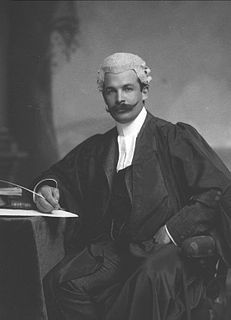Related Research Articles

A lawyer or attorney is a person who practices law, as an advocate, attorney at law, barrister, barrister-at-law, bar-at-law, canonist, canon lawyer, civil law notary, counsel, counselor, solicitor, legal executive, or public servant preparing, interpreting and applying the law, but not as a paralegal or charter executive secretary. Working as a lawyer involves the practical application of abstract legal theories and knowledge to solve specific individualized problems, or to advance the interests of those who hire lawyers to perform legal services. The role of the lawyer varies greatly across different legal jurisdictions.
In its most general sense, the practice of law involves giving legal advice to clients, drafting legal documents for clients, and representing clients in legal negotiations and court proceedings such as lawsuits, and is applied to the professional services of a lawyer or attorney at law, barrister, solicitor, or civil law notary. However, there is a substantial amount of overlap between the practice of law and various other professions where clients are represented by agents. These professions include real estate, banking, accounting, and insurance. Moreover, a growing number of legal document assistants (LDAs) are offering services which have traditionally been offered only by lawyers and their employee paralegals. Many documents may now be created by computer-assisted drafting libraries, where the clients are asked a series of questions that are posed by the software in order to construct the legal documents. In addition, regulatory consulting firms also provide advisory services on regulatory compliance that were traditionally provided exclusively by law firms.
A paralegal is the professional of legal science that performs procedures autonomously or semi autonomously, as part of a legal assistance system, and performs tasks that require understanding of the legislation for its proper execution. They also work in support or assist professionals related to the legal area of a consultative or judicial litigation nature. Its labor market is broad, including consultancies, companies that have legal departments or that perform legislation compliance activities such as: environmental, labor, controlled products, product registration, trademarks and patents, tax, bidding, among others. Legal offices and public bodies also have many paralegals in support activities although they do not yet use the correct name of the profession.
Overtime is the amount of time someone works beyond normal working hours. The term is also used for the pay received for this time. Normal hours may be determined in several ways:

Temporary work or temporary employment refers to an employment situation where the working arrangement is limited to a certain period of time based on the needs of the employing organization. Temporary employees are sometimes called "contractual", "seasonal", "interim", "casual staff", "outsourcing", "freelance"; or the words may be shortened to "temps". In some instances, temporary, highly skilled professionals refer to themselves as consultants. Increasingly, executive-level positions are also filled with Interim Executives or Fractional Executives.
Freelance, freelancer, or freelance worker, are terms commonly used for a person who is self-employed and not necessarily committed to a particular employer long-term. Freelance workers are sometimes represented by a company or a temporary agency that resells freelance labor to clients; others work independently or use professional associations or websites to get work.
A professional employer organisation (PEO) is an outsourcing firm that provides services to small and medium-sized businesses (SMBs). Typically, the PEO offering may include human resource consulting, safety and risk mitigation services, payroll processing, employer payroll tax filing, workers' compensation insurance, health benefits, employers' practice and liability insurance (EPLI), retirement vehicles, regulatory compliance assistance, workforce management technology, and training and development. The PEO enters into a contractual co-employment agreement with its clientele. Through co-employment, the PEO becomes the employer of record(EoR) for tax purposes through filing payroll taxes under its own tax identification numbers. As the legal employer, the PEO is responsible for withholding proper taxes, paying unemployment insurance taxes and providing workers’ compensation coverage.

A law firm is a business entity formed by one or more lawyers to engage in the practice of law. The primary service rendered by a law firm is to advise clients about their legal rights and responsibilities, and to represent clients in civil or criminal cases, business transactions, and other matters in which legal advice and other assistance are sought.
Legal profession is a profession, and legal professionals study, develop and apply law. Usually, there is a requirement for someone choosing a career in law to first obtain a law degree or some other form of legal education.
Permatemp is a U.S. term for a temporary employee who works for an extended period for a single staffing client. The word is a portmanteau of the words permanent and temporary.
Attorney's fee is a chiefly United States term for compensation for legal services performed by an attorney for a client, in or out of court. It may be an hourly, flat-rate or contingent fee. Recent studies suggest that when lawyers charge a flat-fee rather than billing by the hour, they work less hard on behalf of clients and clients get worse outcomes. Attorney fees are separate from fines, compensatory and punitive damages, and from court costs in a legal case. Under the "American rule", attorney fees are usually not paid by the losing party to the winning party in a case, except pursuant to specific statutory or contractual rights.
Legal outsourcing, also known as legal process outsourcing (LPO), refers to the practice of a law firm or corporation obtaining legal support services from an outside law firm or legal support services company. When the LPO provider is based in another country, the practice is called offshoring and involves the practice of outsourcing any activity except those where personal presence or contact is required, e.g. appearances in court and face-to-face negotiations. When the LPO provider is based in the same country, the practice of outsourcing includes agency work and other services requiring a physical presence, such as court appearances. This process is one of the incidents of the larger movement towards outsourcing. The most commonly offered services have been agency work, document review, legal research and writing, drafting of pleadings and briefs, and patent services.
According to the National Association of Legal Fee Analysis (NALFA), legal auditing is a litigation management practice and risk management tool, used by insurance and other consumers of legal services, to determine if hourly billing errors, abuses, and inefficiencies exist by carefully examining and identifying unreasonable attorney fees and expenses. Because the majority of corporate law firms charge clients on an hourly basis, and base attorney promotion and compensation almost entirely on the number of hours billed, rather than the results achieved for clients, lawyers and law firms have much incentive to bill as many hours as possible, and little incentive to work efficiently or to bill fewer hours. According to the California State Bar, most lawyers who block-bill their time inflate each client bill by 10-30 percent, and at the average national billing rate of $661 per hour that means that most big-firm lawyers overcharge clients anywhere from $150,000 to $400,000 each year. According to global ebilling standards LEDES partner, Legal Solutions Group, legal auditing must include reference to guideline non-compliance (GNC) codes, which should be established by consumers of legal services, such as enterprises and insurers. Best practices include ensuring the appropriate title of legal representation, paralegal vs. partner, handles a given task.
A contract attorney is a lawyer who works on legal cases on a contract basis. Such work is generally of a temporary nature, often with no guaranteed employment term.
A law firm network is a membership organisation consisting of independent law firms. These networks are one type of professional services networks similar to networks found in the accounting profession. The common purpose is to expand the resources available to each member for providing services to their clients. Prominent primarily law firm networks include: CICERO League of International Lawyers, First Law International, Alliott Group (multidisciplinary), Lex Mundi, WSG - World Services Group (multidisciplinary), TerraLex, Meritas (law), Multilaw, The Network of Trial Law Firms, Inc., the State Capital Group, and Pacific Rim Advisory Council. The largest networks have more than 10,000 attorneys located in hundreds of offices worldwide.
Law practice management (LPM) is the management of a law practice. In the United States, law firms may be composed of a single attorney, of several attorneys, or of many attorneys, plus support staff such as paralegals/legal assistants, secretaries, and other personnel.

A legal document assistant in the United States is a non-lawyer authorized to assist with the preparation of legal instruments. Unlike a paralegal, legal document assistants do not work under the supervision of an attorney.
A barristers' clerk is a manager and administrator in a set of barristers' chambers. The term originates in England, and is also used in some other common law jurisdictions, such as Australia. In Scotland, the equivalent role is advocate's clerk.

The Fair Labor Standards Act of 1938 29 U.S.C. § 203 (FLSA) is a United States labor law that creates the right to a minimum wage, and "time-and-a-half" overtime pay when people work over forty hours a week. It also prohibits employment of minors in "oppressive child labor". It applies to employees engaged in interstate commerce or employed by an enterprise engaged in commerce or in the production of goods for commerce, unless the employer can claim an exemption from coverage.
A law practice manager, sometimes described as a legal practice manager or director of practice support, is a person with managerial responsibilities at a law firm. The duties of a law practice manager will depend upon the specific role and its purpose.
References
- 1 2 3 Horace R. Brock, Charles Earl Palmer, Linda A. Herrington, Cost Accounting: Principles and Applications (1989), p. 547.
- 1 2 3 John Parry, Disability Discrimination Law, Evidence and Testimony (ABA 2008), p. 113.
- ↑ Arthur G. Greene, American Bar Association Section of Law Practice Management, Strengthening your firm: strategies for success (1997), p. 55.
- ↑ Patrick J. McKenna, David H. Maister, First Among Equals: How To Manage A Group Of Professionals (2012), p. xxv.
- ↑ Avila v. Coca-Cola Co., 728 F.Supp. 685, 715 (M.D. Fla. 1989).
- 1 2 Ellen Weisbord, Bruce H. Charnov, Jonathan Lindsey, Managing People in Today's Law Firm: The Human Resources Approach to Surviving Change (1995), p. 80.